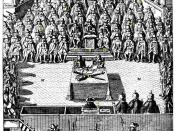Why did a Parliament that had set out to reform monarchical government end up abolishing it? The English Civil Wars were not always a certainty. They were never inevitable, especially at the meeting of the Long Parliament in 1640. The same may also be stated for the demise of Monarchical Government, for it was neither any persons plan nor wish to be-head the King and create a Commonwealth State. In fact Howard Nenner argues that "Up to the eve of the King's execution ways were being sought to salvage the monarchy."1 If this is to be taken into consideration, it becomes evident that the idea of a country without King was not one that was met with rejoice and urgency. Rather, it appears to be a radical action to restore a sense of unity and normality to the Kingdom once again. Therefore, it is essential to look to the King for some responsibility in his own undoing.
It is widely argued by contemporary historians that had Charles handled some of the situations and circumstances that faced him in a more dignified and trustworthy manner, the decision to create a Commonwealth would not have left the minds of those radical thinkers who silently wished it. Charles' attitude and ideals pushed the Parliament that had set out to achieve Monarchical reform to the conclusion of abolishing it because they simply felt that resolution with Charles was unattainable. As Hirst states "Charles died becauseâ¦it was impossible to come to an agreement with him and in a Monarchical State, settlement was impossible without him."2 Throughout the entirety of Charles I's reign -especially his personal rule- he proved himself to be an untrustworthy ruler. His subjects were continually reminded of his tendency to rule according to his own personal wishes and ideals. If the...


